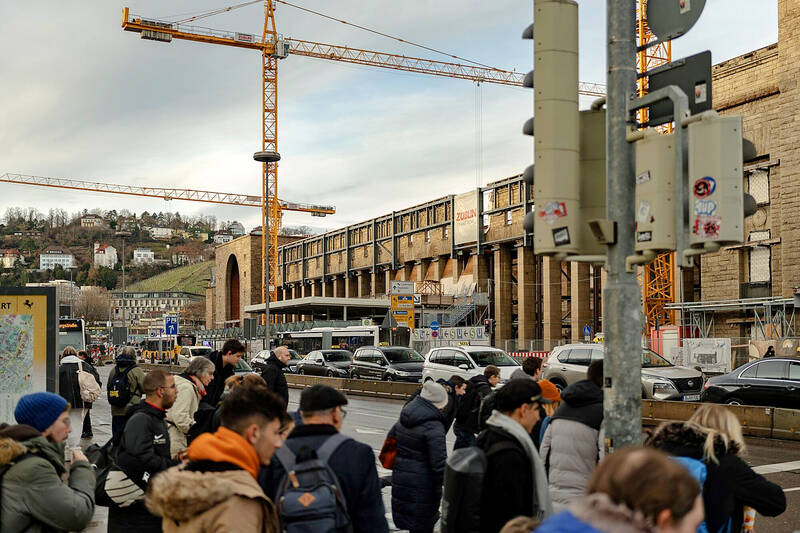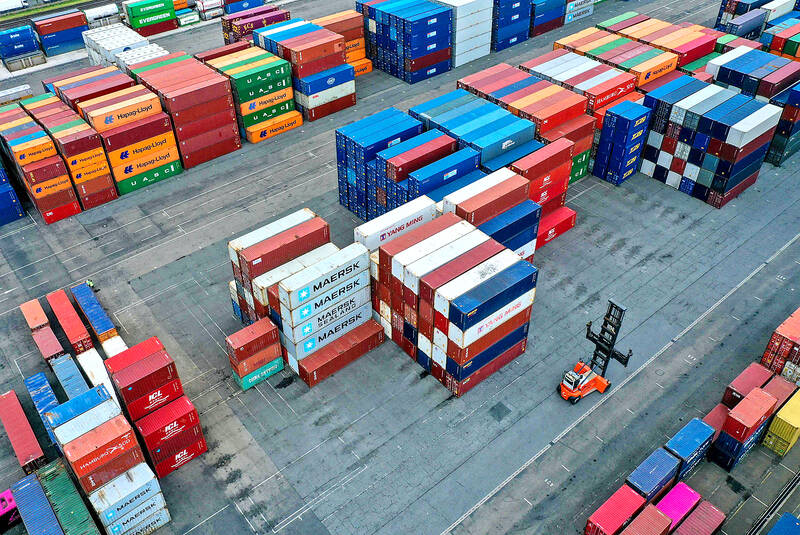風蕭蕭_Frank
以文會友德國作為工業超級大國的日子已經屈指可數了
https://www.taipeitimes.com/News/biz/archives/2024/02/12/2003813420?
作者:Wilfried Eckl-Dorna、Jana Randow、Carolynn Look 和 Petra So
2024 年 2 月 12 日
去年秋天,在杜塞爾多夫一個巨大的生產車間裏,號角演奏者陰沉的音調伴隨著一家百年工廠的最後一幕。
在閃爍的照明彈和火把中,1,600 名失業人員中的許多人麵無表情地站著,看著工廠最後一個產品——鋼管——在軋機上被磨平成完美的圓柱體。 該儀式結束了德國工業化鼎盛時期開始的長達 124 年的運行,並經曆了兩次世界大戰,但未能在能源危機的餘波中幸存下來。
在過去的一年裏,這樣的結局已經多次重複,凸顯了德國麵臨的痛苦現實:它作為工業超級大國的日子可能即將結束。
1 月 17 日,通勤者穿過德國斯圖加特中央車站建築工地附近的道路。隨著許多公司參與每周工作四天的試點,德國振興疲軟經濟的努力即將出現實驗性轉變。 工會表示,這不僅可以讓員工更健康、更快樂,而且還能提高工作效率。
自2017年以來,歐洲最大經濟體的製造業產出一直呈下降趨勢,並且隨著競爭力的削弱,下降速度正在加快。
“老實說,希望不大,”GEA Group AG 首席執行官 Stefan Klebert 說,GEA Group AG 是一家製造機械供應商,其曆史可追溯至 1800 年代末期。 “我真的不確定我們能否阻止這種趨勢。 許多事情必須很快改變。”
德國工業機器的基礎已經像多米諾骨牌一樣倒塌了。 美國正在遠離歐洲,並尋求與跨大西洋盟友競爭氣候投資。 中國正在成為一個更大的競爭對手,並且不再是德國商品的貪得無厭的買家。 對一些重型製造商來說,最後的打擊是俄羅斯大量廉價天然氣的終結。
去年7月13日的鳥瞰圖顯示了位於德國西部杜伊斯堡港的DIT杜伊斯堡聯運碼頭的集裝箱。 上周周一官方數據顯示,由於歐元區國家需求疲軟,德國12月份出口大幅下滑,為歐洲最大經濟體令人失望的一年外貿畫上句號。
除了全球動蕩之外,柏林的政治癱瘓也加劇了長期存在的國內問題,例如破舊的基礎設施、勞動力老齡化和繁瑣的官僚作風。
德國的教育體係曾經是一個優勢,但卻是長期缺乏公共服務投資的象征。 Ifo 研究所估計,到本世紀末,數學技能的下降將使經濟損失約 14 萬億歐元(15 萬億美元)。
在某些情況下,工業減速是小步進行的,例如縮減擴張和投資計劃。 其他的則更為明顯,例如轉移生產線和裁員。 在極端情況下——比如瓦盧瑞克 SACA 的管道廠,曾經是倒閉的工業巨頭曼內斯曼股份公司的一部分——結果是永久關閉。
德國仍然擁有一批令人羨慕的小型敏捷製造商,德國央行和其他機構拒絕接受全麵去工業化即將到來的觀點。 但隨著改革陷入停滯,尚不清楚什麽會減緩衰退。
德國財政部長克裏斯蒂安·林德納在本月早些時候的彭博社活動中表示:“我們不再具有競爭力。” “我們變得越來越窮,因為我們沒有增長。 我們正在落後。”
米其林 SCA 北歐負責人瑪麗亞·羅特格 (Maria Rottger) 表示,工業競爭力的衰退可能使德國陷入螺旋式下降。 這家法國輪胎製造商將關閉其兩家德國工廠,並在明年底之前縮小第三家工廠的規模,此舉將影響超過 1,500 名工人。 美國競爭對手固特異輪胎橡膠公司也有類似的兩個工廠計劃。
她在最近的一次采訪中表示:“盡管我們的員工積極主動,但我們已經無法以有競爭力的價格從德國出口卡車輪胎了。” “如果德國不能在國際環境中具有競爭力的出口,該國就會失去其最大的優勢之一。”
其他經常出現下降的例子。 GEA 集團將關閉美因茨附近的一家泵廠,轉而在波蘭建立一個新工廠。 汽車零部件製造商大陸集團去年 7 月宣布計劃放棄一家生產安全和製動係統零部件的工廠。 其競爭對手羅伯特博世有限公司正在裁員數千名。
2022 年夏季的能源危機是一個主要催化劑。 盡管避免了凍結房屋和配給等最壞的情況,但價格仍然高於其他經濟體,這增加了工資上漲和監管複雜性帶來的成本。
德國呆滯的官僚機構也未能保持經濟增長
王牌,即使公司準備投資。 GEA 在德國西部小鎮厄爾德的一家工廠安裝了太陽能發電設備,生產可將奶油與牛奶分離的設備。 去年一月,即開工前兩個月,該公司申請了供電許可證,目前仍在等待批準——距該項目啟動已近兩年。
此外,中國現在還在多方麵給德國製造麻煩。 除了向先進製造業的戰略轉移之外,這個亞洲超級大國經濟放緩進一步削弱了對德國商品的需求。 與此同時,來自中國的廉價競爭令德國氣候轉型的關鍵行業感到擔憂——而不僅僅是電動汽車。
德國麵臨的逆風需要適應。 對於風扇和通風機生產商 EBM-Papst 來說,工業危機意味著收購一家陷入困境的供應商。 為了保持靈活性,該公司將生產從汽車行業轉向熱泵和數據中心零部件。 它還希望將一些管理任務轉移到東歐或印度。
“這不僅僅是能源,”EBM-Papst 首席執行官 Klaus Geisdorfer 在接受采訪時表示。 “這也是德國員工數量的問題,目前德國的員工情況非常緊張。”
他補充說,十年之內,勞動年齡人口將太少,無法保持經濟像今天一樣運轉。
Germany's days as an industrial superpower are numbered
https://www.taipeitimes.com/News/biz/archives/2024/02/12/2003813420?
By Wilfried Eckl-Dorna, Jana Randow, Carolynn Look, and Petra So
Feb 12, 2024
In a cavernous production hall in Dusseldorf last fall, the somber tones of a horn player accompanied the final act of a century-old factory.
Amid the flickering of flares and torches, many of the 1,600 people losing their jobs stood stone-faced as the glowing metal of the plant’s last product — a steel pipe — was smoothed to a perfect cylinder on a rolling mill. The ceremony ended a 124-year run that began in the heyday of German industrialization and weathered two world wars, but could not survive the aftermath of the energy crisis.
There have been numerous iterations of such finales over the past year, underscoring the painful reality facing Germany: its days as an industrial superpower might be coming to an end.

Commuters cross a road near construction work at Stuttgart Central Station in Germany on Jan. 17. Germany’s struggle to revive its sluggish economy is about to take an experimental turn as a host of companies take part in a pilot to work a four-day week, with labor unions saying it could not only leave staff healthier and happier, but also more productive.
Manufacturing output in Europe’s biggest economy has been trending downward since 2017, and the decline is accelerating as competitiveness erodes.
“There’s not a lot of hope, if I’m honest,” said Stefan Klebert, chief executive officer of GEA Group AG, a supplier of manufacturing machinery that traces its roots to the late 1800s. “I am really uncertain that we can halt this trend. Many things would have to change very quickly.”
The underpinnings of Germany’s industrial machine have fallen like dominoes. The US is drifting away from Europe and is seeking to compete with its transatlantic allies for climate investment. China is becoming a bigger rival and is no longer an insatiable buyer of German goods. The final blow for some heavy manufacturers was the end of huge volumes of cheap Russian natural gas.

An aerial view on July 13 last year shows containers at the DIT Duisburg Intermodal Terminal at Duisburg harbor in western Germany. German exports fell sharply in December on weaker demand from eurozone countries, official data showed on Monday last week, capping a disappointing year in foreign trade for Europe’s largest economy.
Alongside global volatility, political paralysis in Berlin is intensifying long-standing domestic issues such as creaking infrastructure, an aging workforce and the snarl of red tape.
Germany’s education system, once a strength, is emblematic of a long-term lack of investment in public services. The Ifo research institute estimates that declining math skills will cost the economy about 14 trillion euros (US$15 trillion) in output by the end of the century.
In some cases, the industrial downshift is taking place in small steps like scaling back expansion and investment plans. Others are more evident like shifting production lines and trimming staff. In extreme instances — like Vallourec SACA’s pipe plant, once part of fallen industrial giant Mannesmann AG — the consequence is permanent closure.
Germany still has an enviable roster of small, agile manufacturers, and the Bundesbank and others reject the notion that full-blown deindustrialization is anywhere close. But with reforms stalled, it’s unclear what will slow the decline.
“We are no longer competitive,” German Minister of Finance Christian Lindner said at a Bloomberg event earlier this month. “We are getting poorer because we have no growth. We are falling behind.”
Fading industrial competitiveness threatens to plunge Germany into a downward spiral, Michelin SCA northern Europe head Maria Rottger said. The French tiremaker is shutting two of its German plants and downsizing a third by the end of next year in a move that will affect more than 1,500 workers. US rival Goodyear Tire & Rubber Co has similar plans for two facilities.
“Despite the motivation of our employees, we have arrived at a point where we can’t export truck tires from Germany at competitive prices,” she said in a recent interview. “If Germany can’t export competitively in the international context, the country loses one of its biggest strengths.”
Other examples of decline surface regularly. GEA Group is closing a pump factory near Mainz in favor of a newer site in Poland. Autoparts maker Continental AG announced plans in July last year to abandon a plant that makes components for safety and brake systems. Rival Robert Bosch GmbH is in the process of slashing thousands of workers.
The energy crisis in the summer of 2022 was a major catalyst. While worst-case scenarios like freezing homes and rationing were avoided, prices remain higher than in other economies, which adds to costs from higher wages and regulatory complexity.
Germany’s sluggish bureaucracy also is not keeping pace, even when companies are prepared to invest. GEA installed solar capacity at a factory in the western German town of Oelde, where it makes equipment that can separate cream from milk. It applied for permits to feed in the power in January last year, two months before starting construction and is still waiting for approval — nearly two years after initiating the project.
Furthermore, China is now causing trouble for Germany in a number of ways. On top of its strategic shift into advanced manufacturing, a slowdown of the Asian superpower’s economy is sapping demand for German goods even further. At the same time, cheap competition from China is worrying industries key for Germany’s climate transition — and not just electric cars.
Germany’s headwinds require adaptation. For EBM-Papst, a producer of fans and ventilators, the industrial crisis meant acquiring a struggling supplier. And to stay nimble, the company shifted production to components for heat pumps and data centers and away from the auto sector. It’s also looking to move some administrative tasks to eastern Europe or India.
“It’s not just energy,” EBM-Papst CEO Klaus Geisdorfer said in an interview. “It’s also staff availability in Germany, which is now very tense.”
Within a decade, the working-age population will be too small to keep the economy functioning as it does today, he added.




